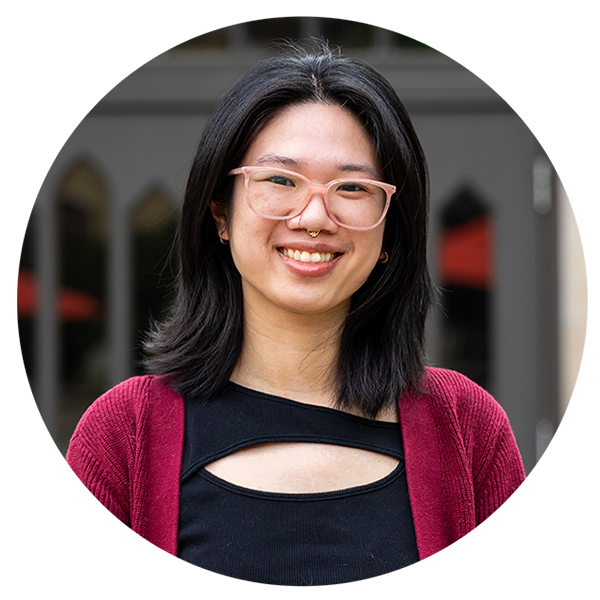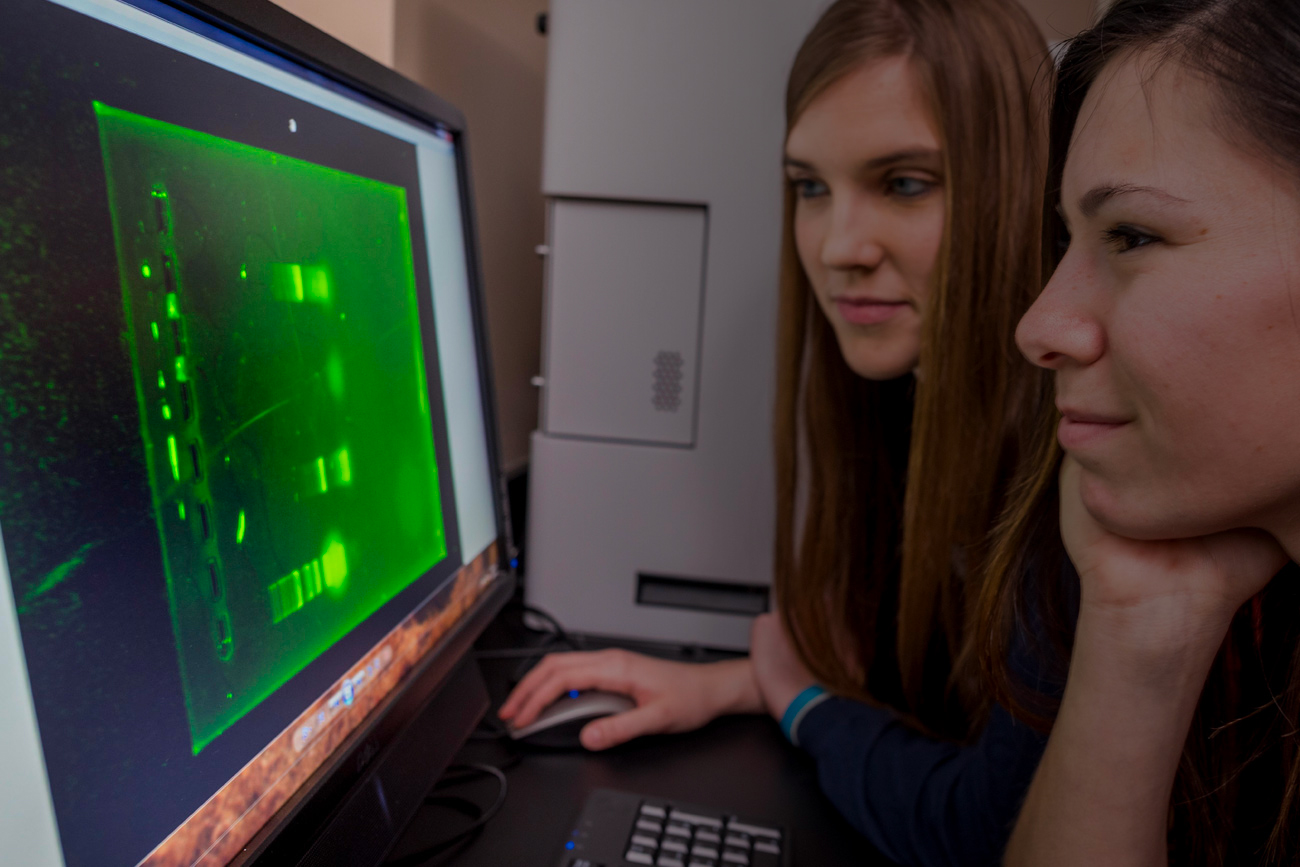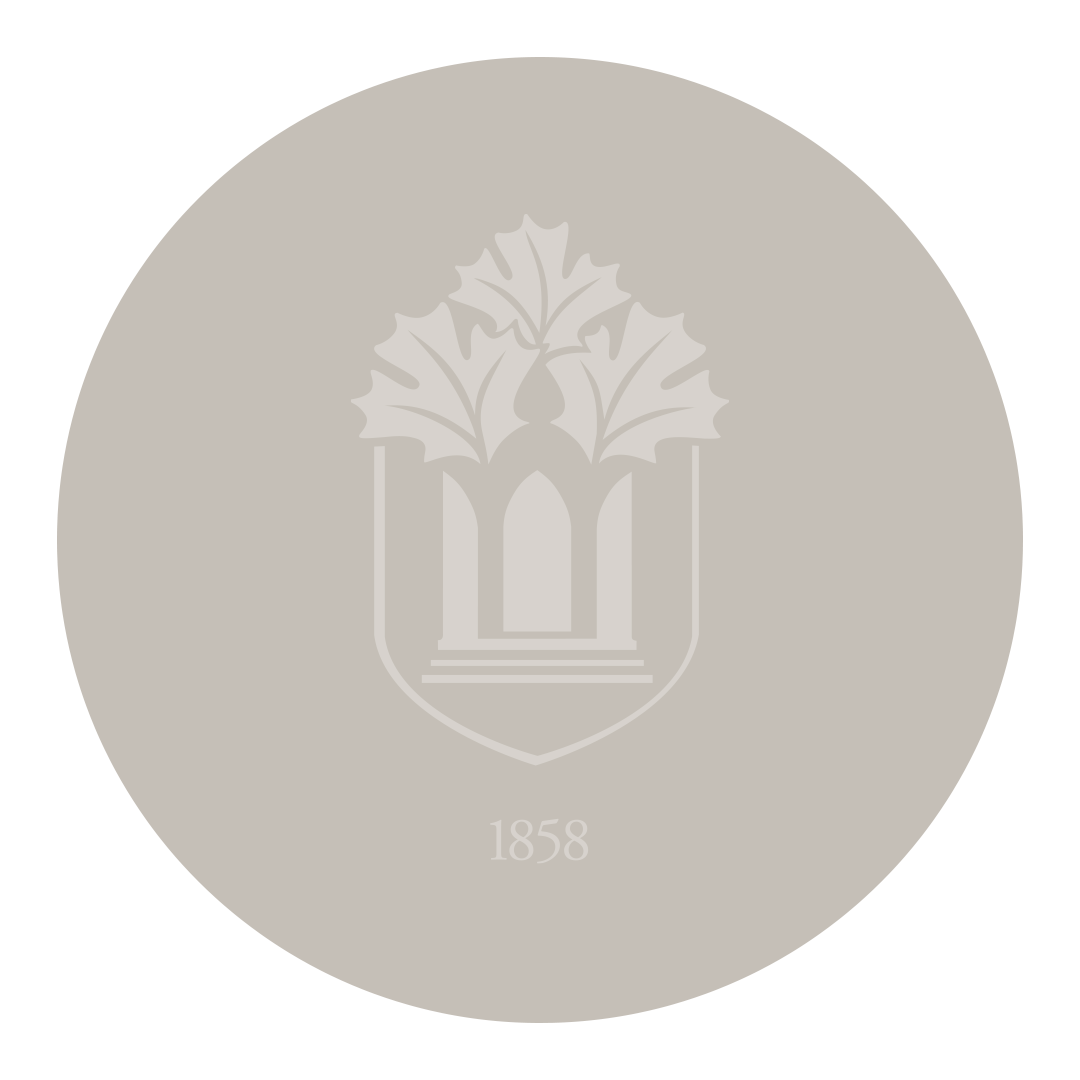

Lily Bay
Administrative Assistant
Boyd Science Center, Howard Hall
What is computer science?
About
Computer Science is everywhere, from the phone in your pocket to the Internet you use to the algorithms that drive social media and viral videos. With information technology advancing at such a rapid pace, there is an ongoing need for those who understand the principles of information, computation, and software development.


Why get a bachelor’s degree in computer science at Baker University?
It’s all about real experiences. Our computer science courses are centered on the practical application of computer programming, AI, neural networks, and framework development.
Through ongoing faculty support, computer science internships, and a high-level computer applications capstone project, you’ll be prepared for success in a variety of information technology careers.
What kind of computer science jobs are out there?
Computer science is such a part of daily life that the career options are virtually endless. Consider just a few of the following roles and specializations:
- Software engineer
- Computer network architect
- Full stack developer
- IT manager
- Computer scientist
- Mobile app developer
- Artificial intelligence engineer
- UX designer
- Web developer

Computer Science Degree Courses
Computer Science Course Descriptions
CS 105 – Topics in Computer Science 3 hrs.
This course will provide students with the opportunity to develop professional and technical skills through project-based learning. Students will discover technology by working collaboratively on a business project that encompasses many areas of technology, discovering in the process how each technical component contributes to the cohesive whole. Enrollment is limited to students in Blue Valley’s CAPS concurrent credit program.
CS 110 – Computer Topics 1 hr.
These are a collection of courses covering a variety of computer topics. Courses of the same number but different topics may be repeated for credit. R; P/NC
CS 131 – Spatial Analysis of Geographic Information 3 hrs.
This course will examine the theory of Geographical Information Systems (GIS), including its historical and practical uses and potential. Students will gain a basic, practical understanding of GIS concepts, technical issues, and applications using Google Earth and ArcView GIS software. The course has been designed for students in a wide variety of fields as an introduction so that they can use spatial analysis within in their chosen field of study and work. Prerequisite: Sophomore status or permission of the instructor.
CS 151 – Introduction to Computing for Non-Science Majors 3 hrs.
This course introduces students to computing as an essential tool of academic and professional activities in disciplines other than science and engineering. Functions and interrelationships of computer system components such as hardware, systems, applications software, and networks are covered. Widely-used applications packages such as spreadsheets and databases are used in a project-focused learning environment. Students will learn key concepts and practices involved in creating technical solutions to problems in different application areas. The social implications of the pervasive nature of technology will be discussed in a global context. Students interested in scientific, computer science, or engineering applications should take CS 175 instead of this course.
CS 154, 155 – Relational Databases I, II 1 hr.
These courses introduce students to the concept of a relational database. Using a microcomputer relational database program, students design a model database including collecting information, deciding on the most effective table and key structure, designing input forms, and preparing reports. In addition, students write simple database programs. Prerequisite: permission of the instructor (for CS 154), CS 154 (for CS 155).
CS 156 – Designing Web Pages with HTML and JavaScript 1 hr.
This course gives students an introduction to computer programming principles by teaching them to use HTML and JavaScript to design web pages. Prerequisite: Permission of the instructor.
CS 175 – Introduction to Computer Science 4 hrs.
This subject is about programming as a creative process by which computers are instructed to carry out tasks to solve specified problems. Fundamental computing concepts will be introduced as well as the principles of programming, including algorithm design, program writing, documenting, debugging, testing, and implementing. Elements of good programming style will be treated as part of this course. Prerequisite: MA 145 or equivalent with a grade of C- or higher.
CS 180 – C++ 2 hrs.
This is a second course in computer programming taught in the C++ language. Topics include fundamental C++ programming, debugging techniques, introduction to pointers and references, a continuation of search and sort techniques, and object-oriented programming. Prerequisite: CS 175 with a grade of C- or higher.
CS 185 – Data Structures and Algorithms 4 hrs.
Approaches to analyzing algorithm complexity introduced in CS 175 Introduction to Computer Science will be reviewed. The complexity class of algorithms will be introduced as one of the major considerations in problem analysis and program design. The use of abstract data types as a design technique, and their implementation in solutions to problems, will form a part of the practical work. Code will be implemented in the form of reusable objects. The concept of “efficient” code and ways to measure efficiency (both empirically by timings, and theoretically in terms of formal models), will be studied. Prerequisite: CS 175 or equivalent with a grade of C- or higher or permission of the instructor.
CS 221 – Computer Systems and Assembly Language 4 hrs.
The course introduces the internal operation of the computer and provides an understanding of how the computer, at a low level, carries out the task of processing data. It deals with the machine language as determined by the architecture, addressing techniques, assembly languages, assembler construction, linkers, loaders, and related operating system software and provides an introduction to the role of the operating system and the compiler, as well as interfacing to peripheral devices. Prerequisite: CS 180.
CS 223 – Computer Architecture and Organization 3 hrs.
This course is about multilevel computers and how they are organized. Three levels will be examined in detail: the digital logic level, the microarchitecture level, and the ISA level. Some of the basic issues to be examined include the overall design of the level, the kinds of instructions and data available, the memory organization and addressing, and the method by which the level is implemented. The study of these topics is called computer organization. Prerequisite: CS 175.
CS 226 – Operating Systems 4 hrs.
The subject introduces main operating system concepts and explains the role of major operating system components. In particular, the subject involves an overview of computer system structures, describes main process and storage management issues, and stresses the importance of protection and security. It covers processes, their creation, and mechanisms for intercommunication. Scheduling algorithms and their applications in allocating processors and ordering data transfers are explained. Mechanisms and policies for memory management are explored, as are approaches for organizing file storage. Problems specific to concurrent programs are reviewed. Prerequisite: CS 180 and 185.
CS 231 – Internet Systems and Technologies 4 hrs.
This course will examine Internet protocols, technologies, and performance issues. Topics will include: TCP/IP, IP Addressing, Address Resolution Protocol (ARP), Asynchronous Transfer Mode (ATM), Ethernet, Gigabit Ethernet, Frame Relay, and Congestion Control/Flow Control. Other topics to be covered include theoretical concurrency models used for specification and simulation, network addressing, contemporary architectures (both hardware and software), and mechanisms to implement distributed processes. Real-world programming examples from the Unix environment will be presented. Prerequisite: CS 185.
CS 275 – Information Systems Analysis and Design 4 hrs.
The aim of the course is to provide students with an introduction to information systems. A study of the analysis and design of computer information systems is undertaken. The course includes developing a study project using CASE tools. In addition to individual learning, students will be introduced to collaborative analysis and design activities undertaken in small groups.
CS 320 – Introduction to Computer Graphics 4 hrs.
This course is an introduction to computer graphics, with particular emphasis on fundamentals underlying computer graphics in the context of computer gaming. Topics include a thorough treatment of transformations and viewing, lighting and shading models, interpolation and averaging, ray tracing, and intersection tracing with rays. Additional topics, covered in less depth, include texture mapping and color theory. Some aspects of animation, including quaternions, orientation, and inverse kinematics will also be covered. Prerequisite: CS 175.
CS 325 – Introduction to Game Design and Development 4 hrs.
The goal of this course is to introduce students to the topic of game programming and to apply and better their knowledge of C++ programming language. Many programming paradigms will be introduced or enhanced during this course, including image processing, controls structures, game loop and animation, and object-oriented approach to programming. Prerequisite: CS 180 and 185.
CS 335 – Computer Networks 3 hrs.
This course offers an introduction to computer networks and computer communications: architecture and protocols; Internet and intranet; design of protocols for error recovery, routing, and congestion control; and satellite networks, local area networks, and distributed systems. Emphasis will be placed on group work with students required to participate in problem-solving communications tasks. Web-based activities will be an essential element in the conduct of this course. Prerequisite: CS 180, 185, and MA 146.
CS 338 – Web Design and Development 4 hrs.
This course provides (a) an introduction to the Java language and some of its standard class libraries, (b) experience with object-oriented design and implementation techniques, and (c) an understanding of the Internet and its importance to modern software systems. Topics will include: the Java language, subsets of Java class libraries (windowing, graphics, networking, threads), object-oriented design and implementation, Internet issues, basis of TCP/IP protocols, Web technologies, HTML and Java, CGI programming, and introduction to security issues. Prerequisite: CS 175.
CS 341 – Programming Languages 4 hrs.
This course is a comparison of the characteristic of programming language paradigms. Data types, storage, binding, abstraction, and encapsulation are studied as a prelude to examining imperative, object-oriented, and functional programming paradigms. Concurrent and logic programming principles are also considered. Prerequisite: CS 180 and 185.
CS 371 – Database Design 4 hrs.
This course investigates the process of relational, hierarchical, and network database design, starting from conceptual database design through logical database design up to and including physical database design, tuning of database applications, and administration. The topics include conceptual database design based on Object Modeling Technique/Unified Modeling Language, methodologies for conceptual design, view integration, logical database design, physical database design, storage allocation, indexing and clustering in relational databases, query processing and optimization techniques, transaction management, and database recovery techniques. Prerequisite: CS 175.
CS 392 – Software Engineering: UML 4 hrs.
Software development is a difficult and challenging task. Apart from the most trivial of problems, the software development process is generally a collaborative rather than an individual effort. To manage the development of complex software artifacts, various principles and practices of software engineering have been formulated. Acquainting students with the principles and practices of managing the software development process is the primary aim of this course. Prerequisite: CS 185 and junior standing. Prerequisite or co-requisite: CS 180.
CS 425 – Advanced Game Design and Development 4 hrs.
The goal of this course is to introduce students to advanced topics of game design and programming. The course will concentrate on 3-D games. In particular, the students will learn to simulate intelligence using steering algorithms and motivation engines; render using HLSL shaders; use advanced 3-D techniques such as forward and inverse kinematics, subdivision surfaces, and radiosity lightning; and manage scenes via portal rendering. Prerequisite: CS 180, 185, 320, and 325.
CS 478 – Business Online 3 hrs.
This course aims to provide students with an understanding of online business in the context of today’s global business environment. This subject covers key areas of online business including: business-to-business and business-to-consumer relations; Internet commerce; Electronic Data Interchange (EDI) standards, regulation, and policy; principles and practices of online business security; and social and economic issues. Prerequisite: CS 175 or permission of instructor. (Cross-listed as BS 478.)
CS 481 – Research Project or Professional Practice/Practicum 3 hrs.
Students who have demonstrated their interest in research activities may enroll for a research project under the supervision of a consulting instructor. Professional practice can be an internship business practicum in appropriate institution or company. Prerequisite: CS 185.
CS 485 – Computer Science Internship 1-3 hrs.
This course involves an internship that is approved by the Computer Science Department. The student must complete at least 40 clock hours for every credit hour earned. The student’s work experience will be under the supervision of a faculty sponsor. Credit earned in this class may count for up to three of the six hours of elective credit needed for the traditional track in Computer Science. R; P/NC
CS 491 – Capstone Project 3 hrs.
A capstone course consisting of individual or group projects undertaken in collaboration with the instructor. This is an opportunity to integrate students’ knowledge of the computer science curriculum by implementing a significant software system. It is required for the major. Prerequisite: CS 392 and senior status.
Scholarships for computer science majors
The Department of Computer Science, Mathematics, and Physics gives these awards with financial prizes to be applied to the following year’s tuition:
- Mildred Hunt Riddle Departmental Recognition Scholarship for Computer Science, Mathematics, and Physics
- Dr. Calvin Foreman Memorial Scholarship
- Howard T. Bonnett Scholarship
- Jennifer Burton Memorial Scholarship
- Grace Barnhill Champlin Memorial Scholarship
- Platt-Butler Endowed Scholarship

Meet the Faculty

Dr. Robert Schukei
Associate Professor of Computer Science, Chair of the Department of Mathematics, Computer Science & Physics
B.S. & M.S. Northwest Missouri State University, Ph.D. Oklahoma State University
Office: Boyd Science Center 324
